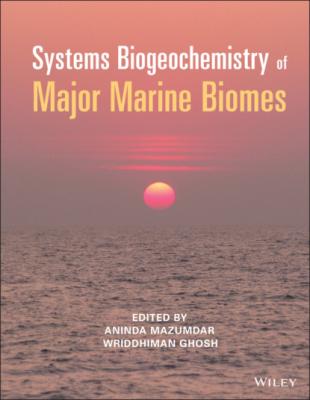Systems Biogeochemistry of Major Marine Biomes. Группа авторов
Чтение книги онлайн.
Читать онлайн книгу Systems Biogeochemistry of Major Marine Biomes - Группа авторов страница 23
 oxygen minimum zone on the western continental‐slope of India. Marine Geology 111 (1–2): 7–13. https://doi.org/10.1016/0025‐3227 (93)90185‐X
oxygen minimum zone on the western continental‐slope of India. Marine Geology 111 (1–2): 7–13. https://doi.org/10.1016/0025‐3227 (93)90185‐X135 Passier, H.F., LutherIII, G.W. and De Lange, G.J. (1997). Early diagenesis and sulphur speciation in sediments of the Oman Margin, northwestern Arabian Sea. Deep Sea Research Part II: Topical Studies in Oceanography 44 (6–7): 1361–1380. https://doi.org/10.1016/S0967‐0645 (97)00014‐3
136 Pattan, J.N., Mir, I.A., Parthiban, G. et al. (2013). Coupling between suboxic condition in sediments of the western Bay of Bengal and southwest monsoon intensification: a geochemical study. Chemical Geology 343: 55–66. https://doi.org/10.1016/j.chemgeo.2013.02.011
137 Paulmier, A. and Ruiz‐Pino, D. (2009). Oxygen minimum zones (OMZs) in the modern ocean. Progress in Oceanography 80: 113–128. https://doi.org/10.1016/j.pocean.2008.08.001
138 Pedersen, T.F. and Shimmield, G.B. (1991). Interstitial water chemistry, Leg 117: contrasts with the Peru Margin. In: Proceedings of the Ocean Drilling Program, Scientific Results, Vol. 117, (W.L. Prell, N. Niitsuma, et al.), 499–513). https://doi.org/10.2973/odp. proc. ir.117.1989
139 Peng, X., Fuchsman, C.A., Jayakumar, A., andet al. (2015). Ammonia and nitrite oxidation in the Eastern Tropical North Pacific. Global Biogeochemical Cycles 29 (12): 2034–2049. https://doi.org/10.1002/2015GB005278
140 Pitcher, A., Villanueva, L., Hopmans, E.C., et al. (2011). Niche segregation of ammonia‐oxidizing archaea and anammox bacteria in the Arabian Sea oxygen minimum zone. The ISME Journal 5 (12): 1896–1904. https://doi.org/10.1038/ismej.2011.60
141 Podlaska, A., Wakeham, S.G., Fanning, K.A. et al. (2012). Microbial community structure and productivity in the oxygen minimum zone of the eastern tropical North Pacific. Deep Sea Research Part I: Oceanographic Research Papers 66: 77–89. https://doi.org/10.1016/j.dsr.2012.04.002
142 Prakash, S., Balakrishnan Nair, T.M., Udaya Bhaskar, T.et al. (2012). Oxycline variability in the central Arabian Sea: an Argo‐oxygen study. Journal of Sea Research 71: 1–8. https://doi.org/10.1016/j.seares.2012.03.003
143 Prasad, T.G., Ikeda, M. and Kumar, S.P. (2001). Seasonal spreading of the Persian Gulf Water mass in the Arabian Sea. Journal of Geophysical Research: Oceans, 106 (C8), 17059–17071. https://doi.org/10.1029/2000JC000480
144 Prasanna Kumar, S., Ramaiah, N., Gauns, M. et al. (2001). Physical forcing of biological productivity in the Northern Arabian Sea during the Northeast Monsoon. Deep‐Sea Research II 48: 1115–1126. https://doi.org/10.1016/S0967‐0645 (00)00133‐8
145 Prasanna Kumar, S, Nuncio, M., Ramaiah, N. et al. (2007). Eddy‐mediated biological productivity in the Bay of Bengal during fall and spring intermonsoons. Deep Sea Research Part I: Oceanographic Research Papers 54 (9): 1619–1640. https://doi.org/10.1016/j.dsr.2007.06.002
146 Rabus, R., Hansen, T.A. and Widdel, F. (2006) Dissimilatory sulfate‐ and sulfur‐reducing prokaryotes. In: The Prokaryotes (eds. M. Dworkin, S. Falkow, E. Rosenberg, t et al.), 659–768. New York, NY: Springer. https://doi.org/10.1007/0‐387‐30742‐7_22
147 Raiswell, R. and Berner, R.A. (1985). Pyrite formation in euxinic and semi‐euxinic sediments. American Journal of Science 285 (8): 710–724. https://doi.org/10.2475/ajs.285.8.710
148 Raiswell, R. and Canfield, D.E. (2012). The iron biogeochemical cycle past and present. Geochemical Perspectives 1 (1): 1–2. https://doi.org/10.7185/geochempersp.1.1
149 Rao, A.M.F., Malkin, S.Y., Hidalgo‐Martinez, S. et al. (2016). The impact of electrogenic sulfide oxidation on elemental cycling and solute fluxes in coastal sediment. Geochimica et Cosmochimica Acta 172: 265–286. https://doi.org/10.1016/j.gca.2015.09.014
150 Rasiq, K.T., Kurian, S., Karapurkar, S.G. et al. (2016). Sedimentary pigments and nature of organic matter within the oxygen minimum zone (OMZ) of the Eastern Arabian Sea (Indian margin). Estuarine, Coastal and Shelf Science 176: 91–101. https://doi.org/10.1016/j.gca.2015.09.014
151 Reeburgh, W.S. (1980). Anaerobic methane oxidation: rate depth distributions in Skan Bay sediments. Earth and Planetary Science Letters 47 (3): 345–352. https://doi.org/10.1016/0012‐821X (80)90021‐7
152 Regaudie‐de‐Gioux, A. and Duarte, C.M. (2012). Temperature dependence of planktonic metabolism in the ocean. Global Biogeochemical Cycles 26 (1). https://doi.org/10.1029/2010GB003907
153 Reimers, C.E. (2007). Applications of microelectrodes to problems in chemical oceanography. Chemical Reviews 107 (2): 590–600. https://doi.org/10.1021/cr050363n
154 Revsbech, N.P., Larsen, L.H., Gundersen, J. et al. (2009). Determination of ultra‐low oxygen concentrations in oxygen minimum zones by the STOX sensor, Limnology and Oceanography Methods 7: 371–381. https://doi.org/10.4319/lom.2009.7.371
155 Riedinger, N., Brunner, B., Krastel, S., et al. (2017). Sulfur cycling in an iron oxide‐dominated, dynamic marine depositional system: the Argentine continental margin. Frontiers in Earth Science, 5, 33. https://doi.org/10.3389/feart.2017.00033
156 Rixen, T., Cowie, G., Gaye, B., et al. (2020). Present past and future of the OMZ in the northern Indian Ocean. Biogeoscience Discussions 10. https://doi.org/10.5194/bg‐2020‐82
157 Ruvalcaba Baroni, I., Palastanga, V. and Slomp, C.P. (2020). Enhanced organic carbon burial in sediments of oxygen minimum zones upon ocean deoxygenation. Frontiers in Marine Science, 6, 839. https://doi.org/10.3389/fmars.2019.00839
158 Sarma, V.V.S.S. and UdayaBhaskar, T.V.S. (2018). Ventilation of oxygen to oxygen minimum zone due to anticyclonic eddies in the Bay of Bengal. Journal of Geophysical Research: Biogeosciences 123 (7): 2145–2153. https://doi.org/10.1029/2018JG004447
159 Sarma, V., Jagadeesan, L., Dalabehera, H. et al. (2018). Role of eddies on intensity of oxygen minimum zone in the Bay of Bengal. Continental Shelf Research 168: 48–53. https://doi.org/10.1016/j.csr.2018.09.008